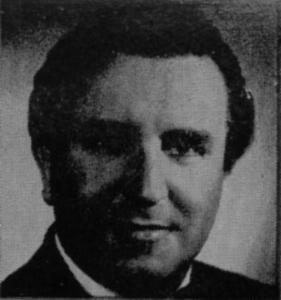He was born Georgios Kokolios in 1916 in Athens, Greece, and passed away in 1964. He was educated in Athens at the National
Conservatory (Ethnikon Odeion) from 1941 to 1945, and started singing in various Greek church choirs, notably in St Constantine
(center of Athens, close to Omonoia Square), St Panteleimon (of Acharnon Street) and, during the German occupation, at St Loucas
church on Patission Street.
At the National Conservatory he was a student of Kiki Vlahou (died 1980), who had a great success educating tenors; another
famous student of hers was George Zervanos, the main tenor of the Athens Lyric in the 1970s, who passed away in 2007.
While at the conservatory, Kokolios was hired as a member of the chorus of the Athens Lyric Opera. In 1943, he was "promoted" to
soloist and appeared first in Lehár's Das Land des Lächelns. In 1944, he sang a minor role in Aida.
Perhaps his best-known early appearance was as Jacquino in the historic performance of Beethoven's Fidelio, staring the young
Maria Callas. That performance was given at the Herodes Atticus Amphitheater in Athens on August 14th, 1944 with Maria Callas as
Leonore, Antonios Delendas as Florestan, Evangelos Magliveras as Pizarro, Georgios
Moulas as Rocco, Zoe Vlachopoulou as Marzelline and Georgios Kokolios as Jacquino, Hans Hörner conducting. There are
numerous photographs from that memorable performance (see for example Nicholas Petsalis-Diomedes, The unknown Callas, page 429,
where Kokolios is the one sitting in front of all the others).
While Maria Callas was accused as a collaborator of the Germans after 1945 (and left for the States), Kokolios was sided with the
left and remained in Athens, where he had a brilliant career, singing at the Athens Lyric Martha, Carmen,
Pagliacci, Mignon, Der Bettelstudent, Alceste (Gluck) and others between 1945 and 1949.
Maria Callas continued communicating with him and invited him in 1949 to Italy (through Vittorio Gui). He came to Rome and
studied at the Accademia di Santa Cecilia (1949–51), while taking also private lectures from Manfredo Polverosi (who was also the teacher of Rina Gigli and Guido Mancini).
Upon graduation, he started singing at the Teatro Comunale in Florence and other Italian theaters. Already in 1950, he sang in
Spontini's Olympia in Florence. On May 26th, 1951 he sang Arrigo in Vespri siciliani at the Maggio Musicale Fiorentino,
with Maria Callas as Elena, Enzo Mascherini as Monforte and Boris Christoff as Procida, Erich Kleiber conducting. By that time
he had adopted the name Giorgio Bardi (from bard, or bardos/vardos in Greek), mostly for recording purposes. [Kutsch and Riemens
indicate his name was Giulio Bardi, but this is not true. All recordings of that period give the name Giorgio Bardi.]
Indeed, Georgios Kokolios has numerous recordings to his credit including Arrigo in the complete 1951 recording of I vespri
siciliani, the Duke of Mantova in a 1956 Rigoletto from the Teatro Eliseo in Rome with Frank Valentino as Rigoletto,
Riccardo in a 1953 Ballo in Maschera from the Teatro Eliseo, Pinkerton in a 1954 Madama Butterfly with Maria Leone,
Brenda Lewis and "Members of the Metropolitan Opera". However, the Met annals do not show that he ever sang with them.
In 1951, he visited Moscow and Leningrad and appeared both at the Bolshoj and the Kirov in Rigoletto and Aida. Soon
thereafter he returned to Greece where – in the fall 1952 – he appeared as Don José in Carmen,
Cavaradossi in Tosca and Pinkerton in Madama Butterfly. Later he was also Enzo Grimaldo in La Gioconda,
Nemorino, etc. He also sang Petros (the role introduced by Umberto Pentivoglio) in the new presentation of Spyros Samaras'
Pringipissa tis Sasonos (The princess of Sazan).
He passed away on September 5th, 1964. He was married to Ileana Prifti.
Along with Giovanni Apostolou, Costa Milona, Pavlos Raptis and Michael Theodore, Georgios Kokolios-Bardi has been one of the best
Greek tenors.
